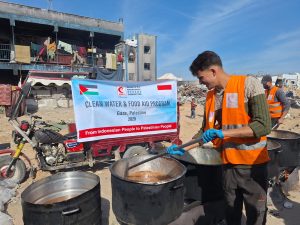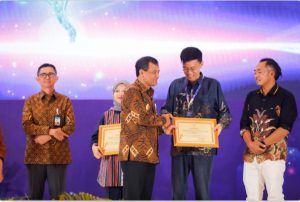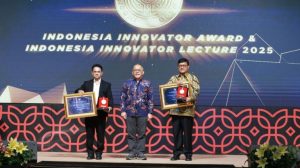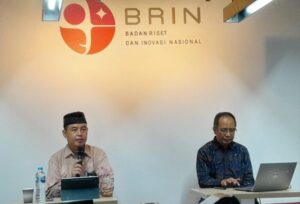Jakarta, MINA – The National Research and Innovation Agency (BRIN) conducts research and development related to halal products, namely detection of halal authentication, substitution of halal ingredients, and development of sea-based products.
Acting Director of Laboratory Management, Research Facilities and Science and Technology Area of BRIN, Dr. Tjahjo Pranoto, said that this effort was in line with the government’s efforts to strengthen the halal industry ecosystem.
“Indonesia, with a majority population embracing Islam, which is 86.9%, has a very large market potential for halal products. For this reason, the government is currently developing a halal industrial area as well as an effort to strengthen the halal industry ecosystem in Indonesia,” said Tjahjo at SAPA MEDIA BRIN with the theme “Halal Research Facility” virtually on Friday.
Regarding detection of halal authentication, Acting The head of the Center for Food Technology and Process Research, Satriyo Krido Wahono, said that so far, to detect halal content in a product, we still use standard procedures, namely through DNA. For this reason, BRIN seeks to conduct research to find a fast method of detecting halal authentication.
Also Read: Indonesian Language Officially Recognized as a Working Language at UNESCO General Conference
“The standard procedure that has been used as a reference based on DNA, is currently mapping out various existing procedures using BRIN’s tools and trying to simplify them,” said Satriyo.
Through the simplification of procedures, it is hoped that the halal authentication detection process for a product can be carried out faster and at a relatively lower cost. Currently, BRIN has three halal product authentication detection facilities, namely in the Cibinong, Serpong, and Yogyakarta areas.
“The three testing facilities have their respective focuses, such as in Cibinong for biological, Serpong the process is through chemistry, and Yogyakarta is not only for detection but also for the development of halal products,” said Satriyo.
He added currently BRIN has conducted research on rapid detection of lard in milk fat using FTIR spectroscopy, and detection of dog meat in beef meatballs using RT-PCR.
Also Read: 34 Investors Commit Rp5 Trillion in Investment in Central Java
Next, BRIN will conduct various halal detection studies, such as detection of halal food products through metabolomic analysis, rapid detection of halal fatty acid-based products in meat and dairy products.
“In addition, porcine gelatin detection will be carried out on non-halal MUI label commercial cosmetic products through proteomics,” added Satriyo.
BRIN not only detects the authentication of halal products but also develops substitute products for non-halal products such as collagen and gelatin which are needed by the public. Collagen is a type of protein made of amino acids that are hard and insoluble in water.
“Collagen is often used as a cosmetic ingredient, but some of the ingredients for this collagen are sourced from non-halal ingredients,” he said.
Also Read: Indonesian Parliament Urges Government and Public to Strengthen Plastic Pollution Control
Likewise, gelatin, explained Satriyo, a substance that is often used as an additive in the manufacture of foods such as pudding or jelly, is obtained by extracting collagen from cartilage or animal skin, and sometimes non-halal animals are used. On this basis, BRIN has developed to produce substitute products for non-halal ingredients.
Although currently many parties have developed gelatin from halal products, said Satriyo, the basic ingredients are still imported from abroad.
“Based on the mapping we did together with the National Committee for Islamic Economics and Finance (KNEKS), there are relatively no domestic products that produce halal raw materials for gelatin,” he added.
According to Satriyo, research related to the development of halal products in Indonesia has been carried out in various research institutions and universities, but the downstreaming of the research products has not yet reached the public.
Also Read: Islamic Economy Pushed as Pillar for Alleviating Extreme Poverty
For this reason, BRIN together with various related parties through a consortium will accelerate the downstream process of various research products related to the development of halal products.
Regarding substitution of non-halal products, BRIN has succeeded in extracting halal collagen from goat skin. Currently being developed the manufacture of fish bone meal as a source of halal gelatin, capsules made from starch and carrageenan.
“Furthermore, research will be carried out for the manufacture of halal gelatin from fish and fish bones, the development of collagen-based products and halal gelatin from goat skin, and enzyme substitution in the cheese production process,” he concluded. (T/RE1)
Mi’raj News Agency (MINA)
Also Read: A400M Aircraft Capable of Sending Humanitarian Missions to Gaza: Prabowo
































 Mina Indonesia
Mina Indonesia Mina Arabic
Mina Arabic